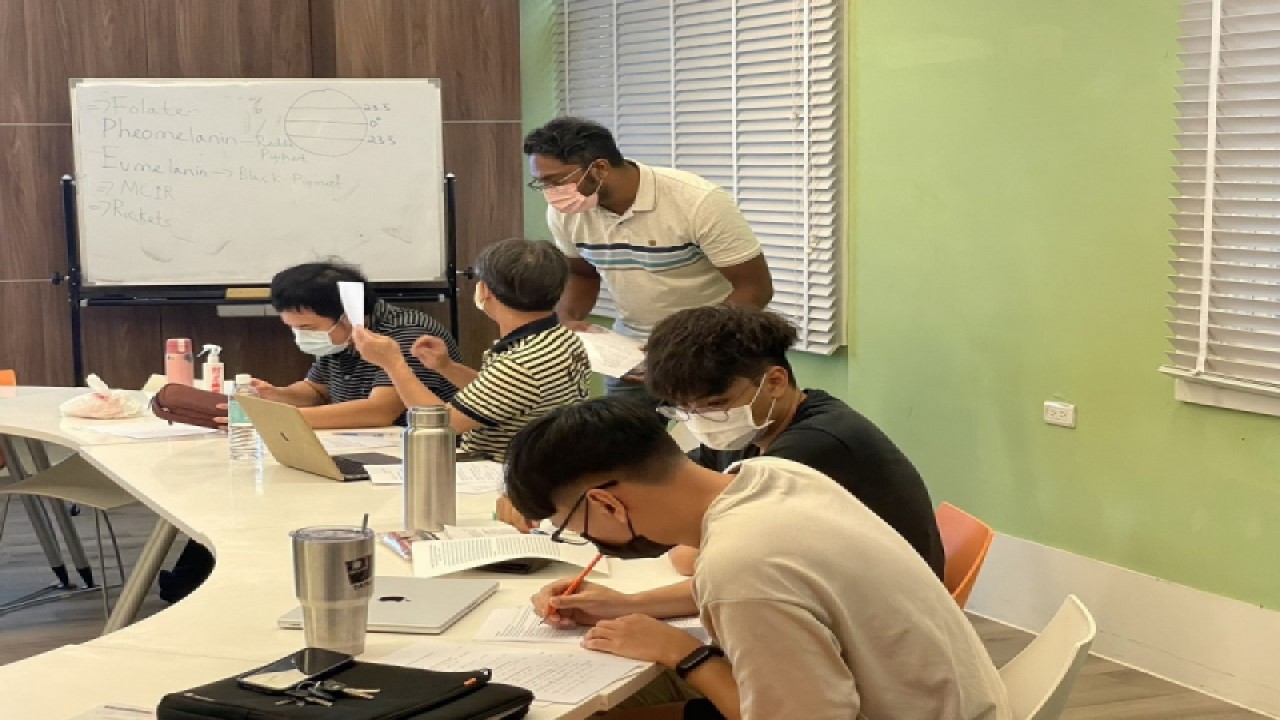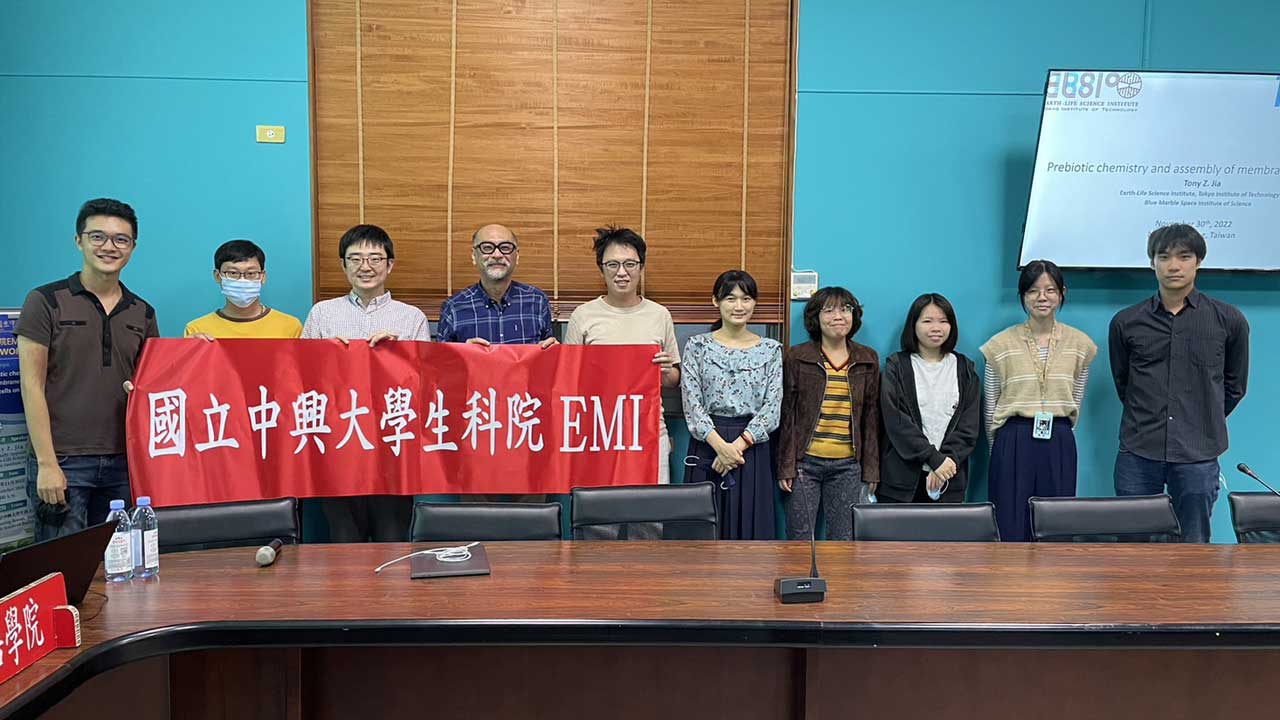Abstract
Highlights of the Implementation Results of the Bilingual Learning Program for College Students in the2021 Academic Year of the College of Life Sciences
In order to achieve the Executive Yuan's goal: "Blueprint for Developing Taiwan into a Bilingual Nation by 2030", the College of Life Sciences of National Chung Hsing University was awarded the grant to implement the Program of Bilingual Education from the Ministry of Education. We are committed to create a bilingual learning environment for cultivating bilingual professionals. The College of Life Sciences established a dedicated committee to promote and implement the program. We encouraged the teachers in the College to obtain the certificate in the EMI Skills Online Course and offer EMI courses for students. We also provided EMI workshops to improve teachers’ EMI pedagogy and incentives for teachers who offer EMI courses. The College developed a website, which archives the digital resources for intercollege sharing. The quality of EMI implementation was constantly assured. The aim of the program was to cultivate young professionals with the capability of global mobility.
The achievements for the EMI program implemented during the academic year 2021 of the College of Life Sciences are highlighted from seven aspects: Institutional Strategy and Management, Teachers and Teaching, Students and Learning, Information to Students, Quality Assurance, Resource Sharing and Intercollege Cooperation and Other Initiatives for Enhancement, which are summarized briefly below.
Institutional strategy and management:
- In order to implement the college-level EMI program, we first set up a college-level EMI promotion unit "Bilingual Education Executive Committee of the College of Life Sciences" to set project goals and formulate implementation strategies.
- To encourage the teachers in our college to offer EMI courses, the committee formulated the measure of "Implementation Points for Rewarding Teachers in English Teaching in the School of Life Sciences, National Chung Hsing University", specifying the incentives for teachers of EMI courses in each department of the College.
- The College held 2 stakeholder meetings to ensure that all stakeholders participate in the formulation of principal decisions of this EMI program and implementation strategy.
Teachers and teaching:
- Encouraged by incentive measures, teachers from various departments of the college actively participated in the establishment of EMI courses. A total of 20 teachers from our school participated in EMI teaching in academic year 2021, which include physical teaching and online teaching. These courses cover professionally taught courses and teacher-student discussion courses. The professionally taught EMI courses include microbiology offered in the bachelor's class, plant taxonomy, advanced ecology, comparative physiology, and fish physiology, molecular virology, genomic biotechnology, epigenetics, medical biotechnology, offered in the master's class. In terms of teacher-student discussion courses, each department offers an EMI seminar course, which guides students to speak in English in a step-by-step manner, enhances their English listening skills, and participates in problem discussions in English through logical thinking. We recorded the lectures of 6 physical EMI courses mentioned above, to provide the content for the online courses.
- In order to improve the ability of teachers to impart professional subject knowledge in English, we encourage our teachers to complete the online EMI course "The Certificate in EMI Skills Online Course" provided by the University of Cambridge. There are a total of 23 teachers in the College completed this online EMI course and got certified. Meanwhile, in order to enhance the English teaching quality of EMI teachers and teaching assistants, the College arranged 5 EMI teaching and training workshops on the topics of EMI pedagogy, English teaching challenges and strategies, EMI course content design and planning, and English academic writing.
Students and learning:
- Since our college offered EMI course electives for students, a total of 44 undergraduate students have taken EMI courses, accounting for about 45.83% of the students in this grade. This number will continue to increase after the College provides more EMI courses for the undergraduate students.
- Since the implementation of this EMI teaching plan, the English proficiency of our students has been initially improved. At present, there are 18 sophomores (18.75% of all sophomores) whose English proficiency has reached the CEFR B2 level, and a total of 28 students except sophomores have reached the CEFR B2 level. With the improvement of English ability, an undergraduate student of the Department of Biological Sciences went to the University of Tübingen in Germany to participate in an international exchange program.
Information to students:
- In order to provide a better teaching and learning platform for the teachers and students of the College of Biological Sciences, the College of Biological Sciences has established the EMI Bilingual College website (https://www.nchu-emi.com/) to facilitate the digitization of course handouts, storage, download and online viewing of the EMI course video files. The College also held a workshop on intellectual property rights to provide teachers with legal knowledge about IP rights after the EMI teaching content is disclosed. We also recorded and stored the English speeches of off-campus speakers on life sciences in English. This webpage also provides storage and viewing media for English videos, such as short interactive videos between foreign students and Taiwanese students of our college.
- In order to make teaching resources available to students in a more timely and efficient manner without being limited by time and space, the School of Life Sciences has developed a student-personalized mobile device App (LifeScienceEMI), which makes the resources of the EMI professional course website available through mobile devices. The students can directly access the online classes directly through the App (iOS and Android). During the severe epidemic period, the service providing a solution for students who are unable to attend classes due to the epidemic highlights the effectiveness of this initiative.
Quality assurance:
- The EMI executive committee of the College held a total of 9 EMI curriculum committee meetings and advisory committee meetings to review and ensure the English teaching quality of our EMI courses and the learning effect of students after implementing EMI teaching.
- In order to obtain the most direct learning feedback from students, we conducted an EMI teaching and learning opinion survey among our students and teachers. A total of 32 student questionnaires (33.33% of sophomores) and 7 teacher questionnaires were collected in this questionnaire survey. The analysis found that more than 60% of students are satisfied with EMI teaching quality, course content and learning effect, and more than 70% of students think that EMI teachers are willing to help solve students' difficulties in EMI learning. In addition, nearly 60% of teachers believe that EMI teaching can improve students' interdisciplinary learning, communication and integration skills.
Intercollege Cooperation:
- Through the website of the EMI Bilingual College of Life Science, we have established an intercollegiate platform to share life science-related teaching and learning materials. All the videos of our EMI courses can be accessed through this website. This network resources are available for the registered users from the off-campus academic departments to promote the sharing and transparency of teaching resources. In the 2021 academic year, the College provided a total of 6 intercollegiate EMI online courses.
- The College of Life Sciences and "Washington International School in Taichung (WIST)" formed a cross-school teacher growth community. The middle school employs sufficient foreign teachers and has considerable experience in EMI teaching in the past. Through this growth community, the EMI of teachers in the College can improve their EMI teaching quality. In addition, we invited Dr. Dony Chacko Matthew from WIST to serve as an off-campus lecturer for the EMI course “Thesis Writing and Speech”.
Other initiatives for enhancement
- The College has established the second specialty certification credits since the 2019 academic year, and promoted UCD-GSP courses (3+X master's degree programs), George Mason University (1+2 master's double degree programs) and other bilateral cooperative studies. The program provides bachelor and master students with a master's degree from an internationally renowned university, and can also expand their international horizons through the process of studying abroad.
- The College established the connection with the industry through the research centers belonging to our College to establish an industrial PhD program, in which the industrials are involved in EMI courses. The aim is to improve students' English skills required for specific industries. At present, there are 7 courses offered by the College, where the industrials participate in the course design and teaching.
The implementation of the EMI program in the academic year 2021 by the College of Life Sciences, National Chung Hsing University has shown outstanding outcomes in the seven abovementioned aspects. The College of Life Sciences of National Chung Hsing University looks forward to expanding the number of teachers, teaching materials and creating a bilingual environment through resource sharing and intercollegiate cooperation to strengthen the effects of EMI, so as to achieve the vision that Taiwan becoming a bilingual nation in 2030.

